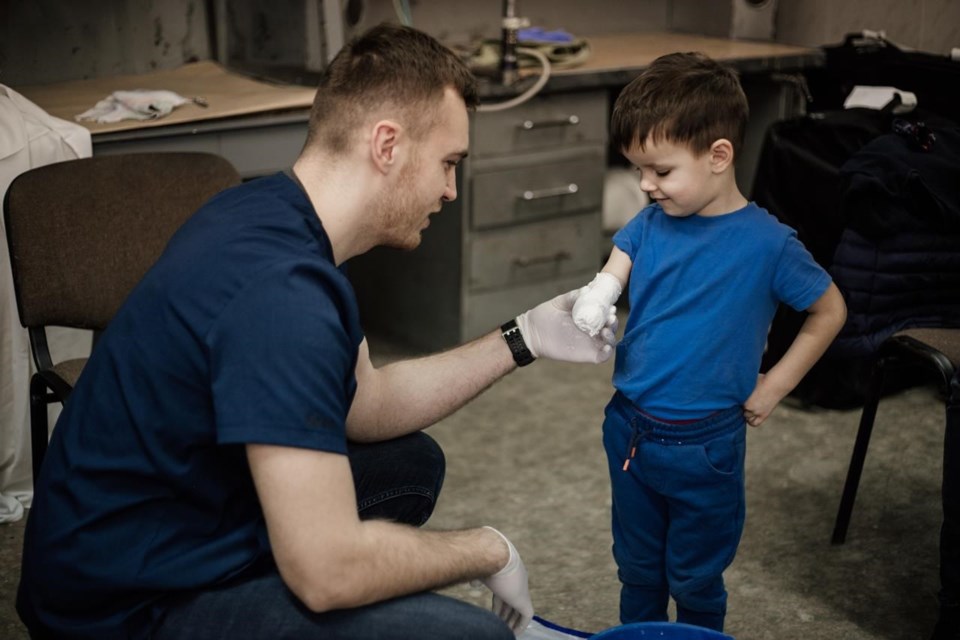Nick Dechev was startled when an air raid siren blared in the western Ukrainian city of Lviv last month.
The resident of Victoria, B.C., was in Lviv setting up one of two prosthetic clinics he hoped would soon help the growing number of amputees across the country.
The startling warnings happened several times while he was there, most of them coming over cellphones.
What surprised him the most was how the people working alongside him in the clinic who heard the alert, glanced at their phones and then carried on as if nothing had happened.
Their indifference eased his mind, he said.
"There was a risk, but I just felt that the probability (of an airstrike) is very small and then the importance of doing the work was so large."
Dechev is the founder and chief technical officer for the Victoria Hand Project, a non-profit organization based in B.C.'s capital that provides low-cost, fully functioning 3D-printed prosthetic arms to amputees in resource-poor countries.
The group's Hands for Ukraine project was launched shortly after Russia invaded Ukraine and demand for prosthetics ballooned, he said.
So far, recipients of the group's limbs in Ukraine have included accident victims and a three-year-old boy born without a right arm, but the goal is to help war victims too.
Since the war began in February 2022, more than 8,000 civilians have been killed and nearly 14,000 have been injured, the United Nations High Commissioner for Human Rights said in a news release Monday.
After almost a year of fundraising and planning, Dechev travelled to partner sites in Ukraine, one in Lviv and one in the central city of Vinnytsia, where he set up equipment and demonstrated fittings, while providing five amputees with prosthetic arms.
"It was a trip to see if a partnership would be possible; to see if they had the right facilities and people," he explained.
Though the Victoria Hand Project is currently operating in 10 countries, Dechev said he didn't know what to expect when he entered Ukraine.
"It's a risk versus reward situation — with the reward being there's a lot of people who really need prostheses. It's a calculation everyone makes, (but) I thought that a lot more good can come from this if I go."
"Everything seemed normal" at first glance, he said, but the closer he looked, the more he noticed impacts of the war.
In Lviv, generators littered the city, "which initially is funny and then you realize it's not funny at all. They don't have power."
In both cities he visited, air raid message alerts, which appeared regularly via cellphones, were also a giveaway.
"Nobody knows where they're going to go, all you know is there's missiles on the air," Dechev said.
Roman Sawycky, president of the Ukrainian Canadian Social Services of Vancouver, said he was impressed that Dechev followed through with the trip.
"The fact that Nick went into Vinnytsia, I would put in some type of a medal on him. It got bombed just shortly before he got there, so he took the chance to go there," he said in an interview.
While the city is far from the war’s front line, Russian missiles did strike civilian buildings and a cultural centre in the city last July.
"I'm looking forward to working with him very closely because I respect them very much for doing that," Sawycky said in an interview.
Ultimately, Dechev deemed the pilot project was success. In addition to the three-year-old boy, the other recipients had lost limbs in industrial or automobile accidents.
"I didn't actually know ahead of time the stories of how these people had lost her limbs because, to be honest, that's not really relevant. The relevance is they have a limb loss, and they need a hand," he said. "But the plan very much going forward is to fit anyone injured in the war, whether they're civilian or whether they're a soldier, with a prosthesis."
He said people with limb loss are often trying to regain a "sense of normalcy" when they are fit for a prosthetic. However, he noted there is about 50 per cent rejection rate for prosthetics, meaning either it doesn't fit properly, or it causes discomfort or pain and they abandon it.
Despite this, "everything is going great" with all five recipients.
"They're really happy. That's really the rewarding part," Dechev said.
He said his organization is actively fundraising with plans to return with a larger team in the coming months to fully train the partner clinics.
The Victoria Hand Project says on its website that the expansion to Ukraine will include "fully equipping both partner sites with necessary 3D printing and 3D scanning tools" and with the needed supplies for prosthetic fittings.
"When we go back, we're going to bring enough supplies for 50 amputees at each site, so, potentially, there's going to be 100 people fitted in the next year," Dechev said. "We're just happy to help."
Sawycky, who has been shipping containers filled with medical equipment and other supplies to Ukraine since 2016, helped with the logistics to co-ordinate the project using his contacts in Ukraine.
"He's giving people a lease on life again," Sawycky said of Dechev. "The need is there now, but it's going to continue for many years."
This report by The Canadian Press was first published March15, 2023.
Brieanna Charlebois, The Canadian Press



